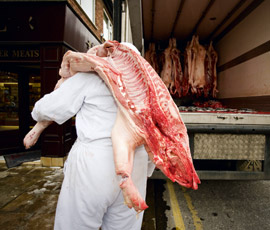Pig pricing system set for shake-up

The “shout price” system of pig pricing has been abandoned by two major processors. With pig numbers tight, others are expected to follow or at least move their shout prices closer to the spot market for finished pigs.
The result of the move has been a 4p/kg dw jump to 170p/kg for those supplying Woodheads, owned by Morrisons and processing more than 20,000 pigs a week for the retailer.
Cranswick has also withdrawn from publishing a weekly shout price, confirmed Chris Aldersley, managing director of Cranswick Country Foods. The company would now deal directly with producers on an individual basis, he said. This leaves Tulip, Karro and Gills still using the shout price system.
Shout prices have been widely criticised by producers, including for the increasingly wide gap between shout prices and the Deadweight Average Pig Price.
Growing competition for pigs on the back of high demand for home-produced meat has pushed up spot prices for uncommitted pigs in competition with shout prices recently.
Marketing groups and producers had also expressed concern over premium and bonus payments made to producers under the shout price system, which were not being fed though to BPEX as part of their overall DAPP calculation, said pig business consultant Peter Crichton. This had led to an under-reporting of the DAPP.
Shout price background
- Introduced in 2009 and used by five key processors
- Prior to this week’s changes was thought to cover about 25% of UK finished pigs traded
- Pigs committed to a processor on ongoing basis but with the price announced only on the Friday of the week before pigs are sent for slaughter
- Up to one year’s notice required from producers
The new contracts are expected to be far more flexible on notice periods and length of contract compared with shout price agreements, which required up to a year’s notice to be given.
“We have developed a new weekly pricing model for pig farmers after listening to their concerns about the shout pricing system,” said a Morrisons spokesperson.
“Our model takes in a number of external market indicators to arrive at a price, giving more transparency for the farmers that wish to sign up, and we will continue to feed into DAPP.”
It was difficult to know how the remaining three shout price buyers intended to proceed, said Mr Crichton. “They may stick to the system but move their shout prices closer to market levels or introduce a retrospective pricing system to reflect the DAPP or if they ditch the shout price system, move to a matrix price as Woodheads and Cranswick may do, or a DAPP+ price.”
Either way, producers would have less of a problem if the shout price reflected the real market, said Mr Crichton. “Between mid-July and now EU producer pigmeat prices have risen by 13p/kg yet shout prices have dropped by 3p/kg.”
Trust was the big issue for the future of contracts, said BPEX chief executive Mick Sloyan. “The ones that we have seen working over the years are those where the risk is shared and the (price) swings are taken out for both sides,” he said, adding that BPEX offers advice on contracts and formulae.
Pig prices could plateau due to import threat

